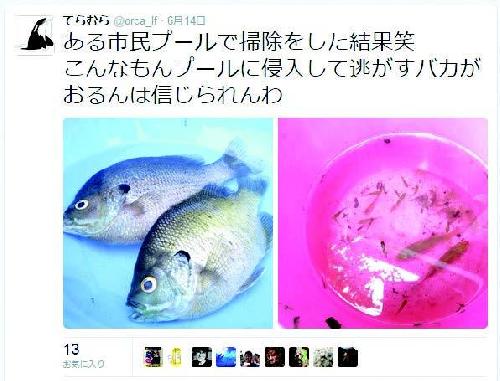Posing a significant threat to the native biodiversity in Japan, specifically that of threatened aquatic insects, some alien fishes, such as the bluegill, have become the reason for strict prohibitions. All activities potentially capable of introducing the species into the wild are currently punishable by either a fine of up to 3 million yen for a person (100 million yen for corporations), or a prison sentence of up to 3 years.
Recently, ten years after the law has been adopted, illegal release of bluegill fish has been reported for the first time with the help of a post on Twitter from Akinori Teramura, undergraduate student at the Tokyo University of Marine Science and Technology and second author of the present study. The case is reported and discussed by him and two scientists, affiliated with Kanagawa Prefectural Museum of Natural History, Japan, in the open-access journal ZooKeys.
In June 2015, Akinori Teramura tweeted two photographs of the invasive bluegill fish, both adults and juveniles, along with two young goldfish, which do not belong to the local fauna, either. In his post he identified the species and shared his surprise at the irresponsibility of the people who had released the fish. When lead author Dr Yusuke Miyazaki saw the tweet, he signalled his colleagues with the idea to publish the information as a scientific report.
 A tweet including two fish images posted on June 14, 2015. The image on the left showstwo bluegill fish, while the one on the right shows juveniles of L. macrochirus macrochirus and two young goldfish. The comments are translated into English as follows: "The results of a pool cleaning. I cannot believe the foolishness of the person who introduced these fish into the pool." Credit: Akinori Teramura
A tweet including two fish images posted on June 14, 2015. The image on the left showstwo bluegill fish, while the one on the right shows juveniles of L. macrochirus macrochirus and two young goldfish. The comments are translated into English as follows: "The results of a pool cleaning. I cannot believe the foolishness of the person who introduced these fish into the pool." Credit: Akinori Teramura
The student found them in an outdoor public pool in Yokohama city, Japan, while it was being cleaned before being opened ahead of the summer. Usually, these facilities are closed to the public during the colder seasons and it is then when native aquatic insect species, such as dragonflies and diving beetles, find spawning and nursery habitats in them. Curiously enough, though, the pool had been isolated from natural waters since its construction.
Therefore, the researchers conclude that the alien fishes have most likely been released from an aquarium from a local shop or an aquarist who no longer wanted them. However, the authors note that according to the law, keeping bluegill fish in a home aquarium is illegal as well.
"Our report demonstrates an example of web data mining in the discipline of Citizen Science," say the authors. "Web data mining has been rapidly developing over recent years, and its potential continues to expand."
"Community awareness of this issue needs to be improved, and widespread reporting of cases such as this one will help," they conclude.
source: Pensoft Publishers